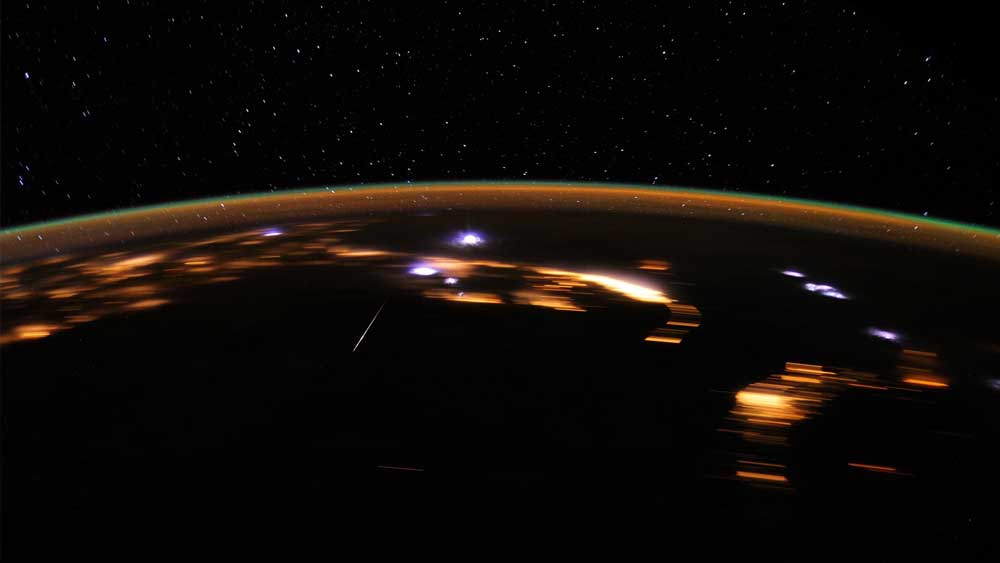The heavens are expected to declare even more of God’s glory1 this week. Probably early Wednesday morning, the Lyrid meteor shower will peak.2 For those who are socially isolated due to the coronavirus pandemic, this event is an opportunity to enjoy a little more of God’s creation, as well as a reminder that our solar system is young.
As comets approach the sun, they lose material as ices in the comet nucleus vaporize. Sometimes bits of material break off the comet nucleus. Meteor showers occur when the Earth’s orbit passes through high concentrations of debris in a comet’s orbital path. As these cometary fragments enter our atmosphere at very high speed, they burn up, causing “shooting stars.”
The Lyrid meteor shower occurs every year around April 16-25 when the Earth passes through debris from one particular comet, Comet Thatcher. Those who want to see these “shooting stars” should watch the late evening to pre-dawn skies starting Sunday evening, April 19. The shower peak is expected in the very early (pre-dawn) hours on Wednesday, April 22, but it is possible that the Lyrids may also put on a good show the following evening.
For those wanting to view this meteor shower, astronomers recommend, that you find a viewing location with dark skies away from city lights, if possible. You may still see some meteors even with light pollution, but the show will likely be much better if you are aware from the city lights. Also, they recommend patience and, frankly, not getting your expectations too high! Under ideal conditions, you might see 10-15 meteors per hour, although outbursts have been known to occur, with as many as 100 meteors per hour.2
Meteor showers are a reminder that comets have finite lifetimes due to their loss of material.3-5 Most comets can only remain visible for thousands of years. Secular astronomers think comets are “leftovers” from the solar system’s formation billions of years ago. But if comets only last thousands of years, then how can we still have comets in a solar system that is billions of years old?
Secular astronomers argue that “reservoirs” re-supply the solar system with new comets to replace those that are no longer visible. However, there are problems with this idea. For instance, Comet Thatcher is a long-period comet6 that is supposed to originate from a hypothetical reservoir of comet nuclei called the Oort Cloud. However, even the late astronomer Carl Sagan acknowledged that there was not a shred of direct evidence for this hypothetical Oort Cloud.7 Also, because comets are supposedly “leftovers” from the solar system’s formation, they would have had to “migrate” outward in order to form and populate the Oort Cloud. Yet computer simulations have shown that most of the comet nuclei would have smashed into each other and been destroyed during this outward migration process!8
So if you and your family are looking for something fun to do, look to the evening skies this week!
References
1. Psalm 19:1-2.
2. McClure, B. and D. Byrd. Lyrid meteor shower: All you need to know. EarthSky. Posted on earthsky.org April 16, 2020, accessed April 18, 2020.
3. Alas, Comet Atlas, which we described in reference 4, is already breaking up and will probably not put on a good show in May.
4. Hebert, J. Comet ATLAS: Nighttime Diversion for Isolated Families. Creation Science Update. Posted on ICR.org March 26, 2020, accessed April 18, 2020.
5. Rao, J. As Comet ATLAS crumbles away, Comet SWAN arrives to take its place for skywatchers. Space.com. Posted on space.com April 18, 2020, accessed April 18, 2020.
6. A long period comet is one that takes more than 200 years to complete one orbit around the sun. Comet Thatcher’s orbital period is roughly 415 years.
7. Sagan, C. and A. Druyan. 1985. Comet. New York: Random House, 398.
8. Stern, S. A. and P. R. Weissmann. 2001. Rapid collisional evolution of comets during the formation of the Oort Cloud. Nature. 409 (6820): 589-591.
*Dr. Jake Hebert is Research Associate at the Institute for Creation Research and earned his Ph.D. in physics from the University of Texas at Dallas.

Lyrid Meteor Shower Peaks This Week
The Latest
Scientists Question Foundational Big Bang Assumption
In April 2024, some of the world’s leading cosmologists convened at the Royal Society in London to question the cosmological principle—the...
Moroccan Dinosaurs in Marine Rocks, Too
Two recent papers by paleontologist Nicholas Longrich and his colleagues describe some unexpected findings in phosphate mines of northern Morocco.1,2...
CREATION PODCAST
Ernst Haeckel: Evolutionary Huckster | The Creation Podcast:...
Ernst Haeckel, a German Zoologist, is famous for developing a series of images of embryos in development called Anthropogenie. These images,...
Bees Master Complex Tasks Through Social Interaction
Bees are simply incredible.1,2 These little furry fliers challenge the very foundation of Darwinism in many diverse ways.
Bees have been...
The Tail of Man’s Supposed Ancestors
Although it has been known for decades and despite insistence to the contrary from the evolutionary community, man—Homo sapiens—has never...
When Day Meets Night—A Total Success!
The skies cleared above North Texas on Monday, April 8, for a spectacular view of the 2024 Great American Solar Eclipse. Hundreds of guests joined...
The Sun and Moon—Designed for Eclipses
Before discovering thousands of planets in other solar systems, scientists tended to assume that other solar systems would be very similar to our own....
Let ICR Help You Prepare for the Great American Solar Eclipse!
On Monday, April 8th, the moon will move directly between the earth and the sun, resulting in a total solar eclipse visible in northern Mexico, much...
Total Eclipse on April 8th
“You alone are the LORD; You have made heaven, the heaven of heavens, with all their host, the earth and everything on it, the seas and all that...
CREATION PODCAST
Dismantling Evolution One Gear At A Time! | The Creation Podcast:...
The human body is a marvel of complexity and the more we learn about it, the more miraculous our existence becomes! Can evolution explain the...




















